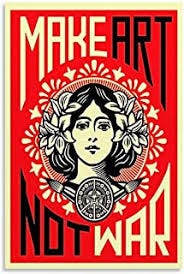Make Art not War
This is a poster I bought from one of those bijou little booths on the left bank in Paris. I’d seen the image before and it resonated so I was delighted to find a cheap copy of it to put up in my studio.
Just a few days later, the image in this poster took on a whole new level of meaning.
I took a trip to see an exhibition at the Louis Vuitton Foundation, The Marazov Collection. It was a pilgrimage in a sense, a long traipse to a building that intrinsically offends me for all that it stands for, to see a collection of paintings I thought I would like.
I was totally unprepared for the level of emotion the exhibition stirred in me. I found myself in tears in front of a Renoir portrait, wanting to hug any of the other people there gazing at it.
Every room was crammed with gems. Cézanne, Renoir, Monet, Bonnard, Sisley, Derain, Picasso, Matisse. Sculptures by Camille Claudel and Rodin. Two exceptionally moving pieces by Van Gogh. In addition, there were works by Russian painters I have never heard of whose work is every bit as stirring and beautiful as the coterie of French and British painters we associate with the impressionists and modernists.
Moving through landscapes and interiors, gazing at portraits of people who could have stepped from the canvas to shake your hand, I was filled with a sense of longing for something I could never have. I wanted to be in those salons, taking tea from the samovar with the family and friends of the Marazov family.
I wanted to step into the field of pink poppies that Cézanne painted, to lie down on the bank and contemplate the pond in Monet’s garden. So much love, so much caressing of the landscape, of the human form, of the lives of ordinary people.
At each canvas, I thought about the journey to bring it here, to this place at this time.
These paintings were collected by a couple of Russian millionaires, the nineteenth century equivalent of today's oligarchs, for their own private enjoyment. Yet their great grandfather was a serf who bought his freedom and established his firm weaving silk ribbons. The family's fortune was made from selling fripperies to the rich.
Artists have always been moved by the life and lives they see around them. Sure, the Impressionists, like all other painters, were keen to earn a living from their art. But above all, they wanted to let the world know about this particular slice of beauty, this moment of transcendence that they found in the play of the light, the fall of the fabric, the curve of a leg. In so doing, they were trying to find the golden thread of compassion, of empathy that runs between us all.
And I felt a flood of sadness for the state of the world.
These collections have had a chequered history. Buffeted by politics, they have been in favour and not in favour. In 1919, Ivan Marazov was forced to flee the country and leave it all behind to be swept up into the arms of the Soviet machine. At one point even, they were in danger of being destroyed by the Bolsheviks, to be restored, finally, in the 60’s after Stalin’s death.
And now, the paintings are once again hostages, being held by the French because they cannot be returned to Russia while the war with Ukraine is going on.
Art connects us to the soul of the painter. To the moment when, squinting at the landscape in front of them, the paintbrush poised before the canvas, they were struck by the deep love it stirred in them.
Now more than ever we need that love. We need to make art not war.



Beautiful, insightful words. Very moving.
"To the moment when, squinting at the landscape in front of them, the paintbrush poised before the canvas, they were struck by the deep love it stirred in them." yes, absolutely - you put it all so beautifully!